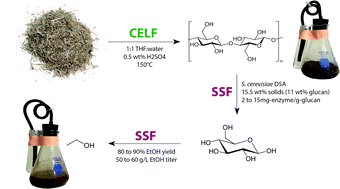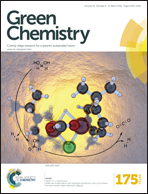CELF pretreatment of corn stover boosts ethanol titers and yields from high solids SSF with low enzyme loadings†
Abstract
A major challenge to economically produce ethanol from lignocellulosic biomass is to achieve industrially relevant ethanol titers (>50 g L−1) to control operating and capital costs for downstream ethanol operations while maintaining high ethanol yields. However, due to reduced fermentation effectiveness at high biomass solids loadings, excessive amounts of enzymes are typically required to obtain reasonable ethanol titers, thereby trading off reduced operating and capital costs with high enzyme costs. In this study, we applied our newly developed Co-Solvent Enhanced Lignocellulosic Fractionation (CELF) pretreatment to produce highly digestible glucan-rich solids from corn stover. Simultaneous saccharification and fermentation (SSF) was then applied to pretreated solids from CELF at 15.5 wt% solids loadings (corresponding to 11 wt% glucan loadings) in modified shake flasks to achieve an ethanol titer of 58.8 g L−1 at 89.2% yield with an enzyme loading of 15 mg-protein per g-glucan-in-raw-corn-stover (-RCS) in only 5 days. By comparison, SSF of corn stover solids from dilute acid pretreatment at 18.3 wt% solids loading (or 10 wt% glucan loading) only achieved an ethanol titer and a yield of 47.8 g L−1 and 73.0%, respectively, despite needing longer fermentation times (∼20 days) and an additional 18 h of prehydrolysis at 50 °C. Remarkably, although longer fermentation times were required at more economical enzyme loadings of 5 and 2 mg-protein per g-glucan-in-RCS, high solids SSF of CELF pretreated corn stover realized final ethanol titers consistently above 50 g L−1 and yields over 80%.



 Please wait while we load your content...
Please wait while we load your content...